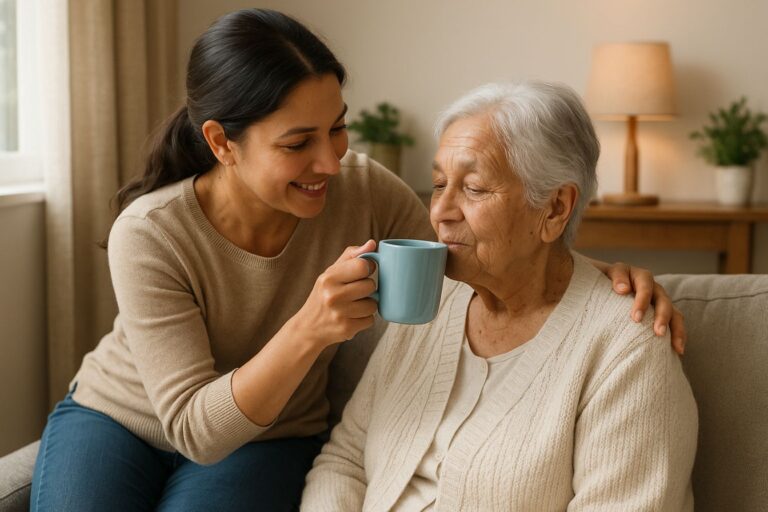There’s something special about home. The familiar smells, the cozy chair by the window, the family photos that tell a lifetime of stories.
For many aging adults, staying in that environment is what truly keeps them happy and grounded.
That’s why more families are choosing at home care for seniors instead of institutional settings. It’s not only about comfort, it’s about preserving dignity, independence, and connection.
Caring for elderly at home can be one of the most rewarding things you’ll ever do!
It’s a chance to give back to the people who raised you, supported you, or shaped your life. Yet it also comes with challenges that require patience, structure, and access to the right resources.
From daily assistance to meaningful activities for elderly at home, the right approach transforms caregiving from a chore into a deeply fulfilling experience.
With modern non medical home care and assisted home care services, it’s easier than ever to create a safe, joyful home life for older adults.
The Basics of Caring for the Elderly at Home

Providing consistent, thoughtful care sets the foundation for a safe and happy home environment. The following are key elements of quality at home health care and support:
- Conduct regular safety checks throughout the home
- Keep pathways clear and lighting bright
- Plan nutritious meals and ensure hydration
- Manage medications and track appointments
- Encourage light daily exercise and mobility
- Schedule time for companionship and conversation
- Support emotional well-being and mental stimulation
- Respect privacy, preferences, and routines
- Stay in touch with medical providers and family
Good care begins with structure and continues with empathy. When caregivers focus on these essentials, seniors feel supported and valued in their own home.
Creating A Plan For How To Take Care of Elderly At Home
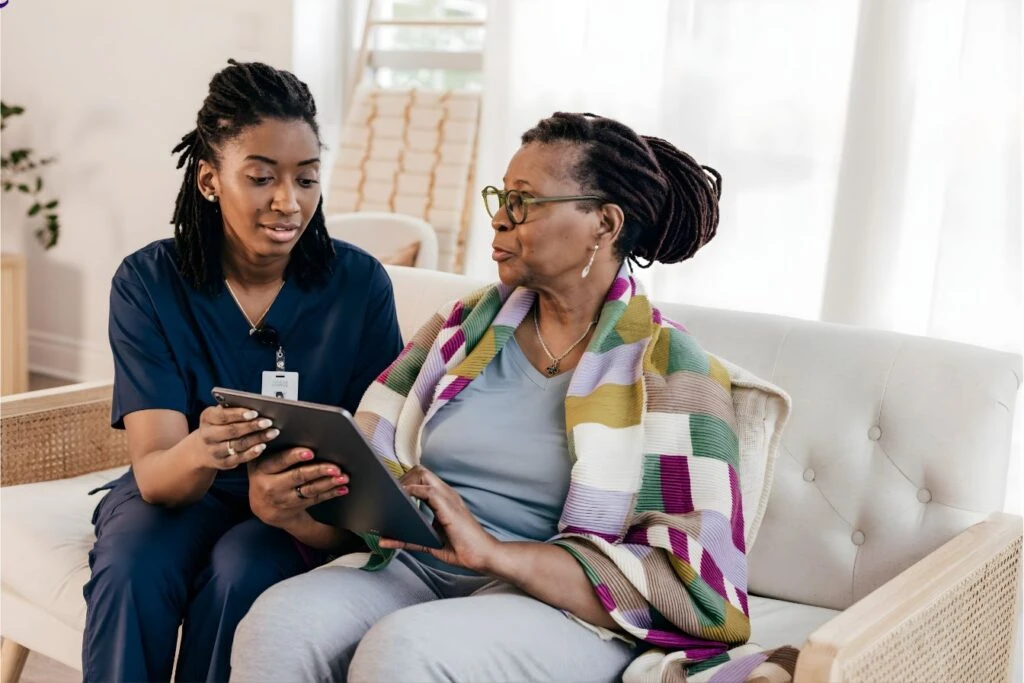
Every individual has unique physical, emotional, and social needs. The NIH provides basic recommendations, but a customized plan helps organize responsibilities and ensures consistent care.
A strong care plan for seniors living at home should include:
- Assessment of daily needs: Meals, bathing, medication, and transportation.
- Safety review: Remove tripping hazards, install grab bars, and improve lighting.
- Health monitoring: Track vital signs and maintain doctor’s appointments.
- Social and recreational goals: Include enjoyable activities for elderly at home to keep spirits high.
- Communication plan: Keep family members informed of progress and changes.
Families can partner with Happier at Home to create a flexible plan that adapts as needs evolve. The right structure allows caregivers and family members to coordinate seamlessly.
Activities for Elderly at Home
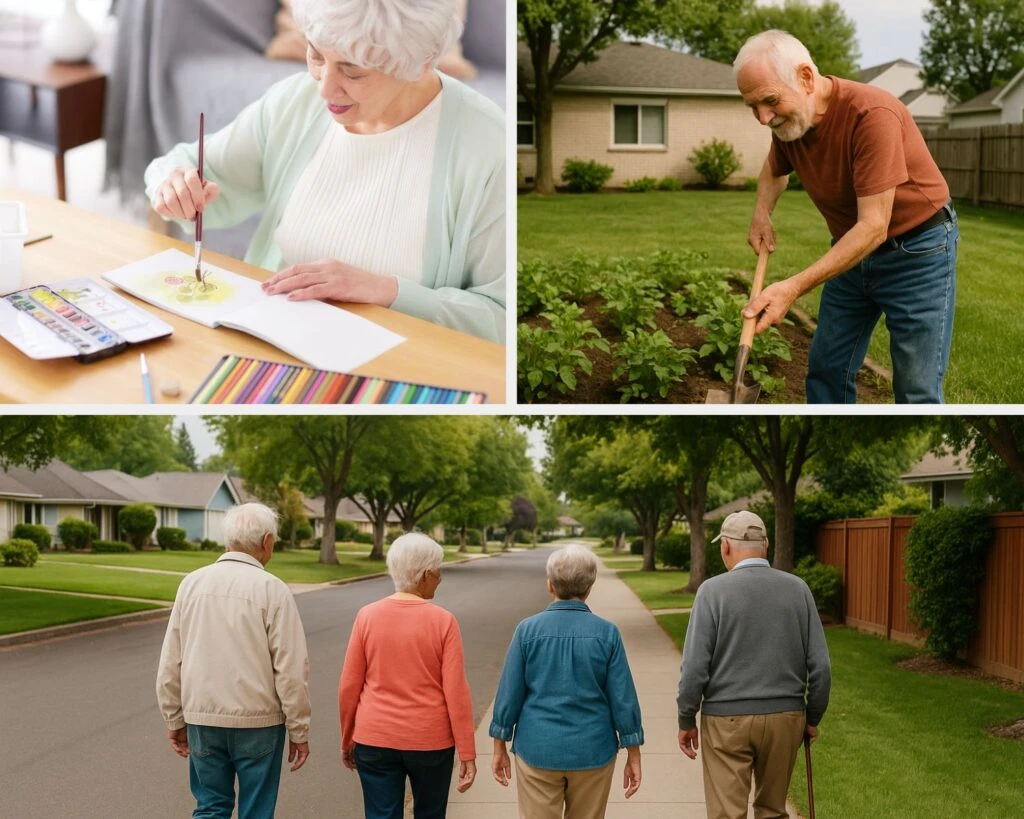
Staying active helps seniors maintain independence, memory, and a sense of purpose. Planning stimulating day trips for seniors is wonderful and even small, daily routines can make a big difference.
Here are some meaningful and fun activities for elderly at home:
- Gentle physical activity: Walking, stretching, or light chair exercises.
- Creative hobbies: Painting, knitting, or crafts that promote fine motor skills.
- Music and memories: Listening to songs from their youth or creating playlists.
- Brain games: Crosswords, puzzles, or memory cards to improve cognition.
- Gardening or plant care: Brings joy and encourages movement.
- Virtual meetups or video calls: Stay connected with family and friends.
- Cooking together: Simple recipes can spark conversation and engagement.
These activities are not only enjoyable but also enhance mental health and improve quality of life for seniors. Senior home companions can play an essential role in keeping seniors engaged and motivated.
Helpful Equipment for Caring for Seniors at Home
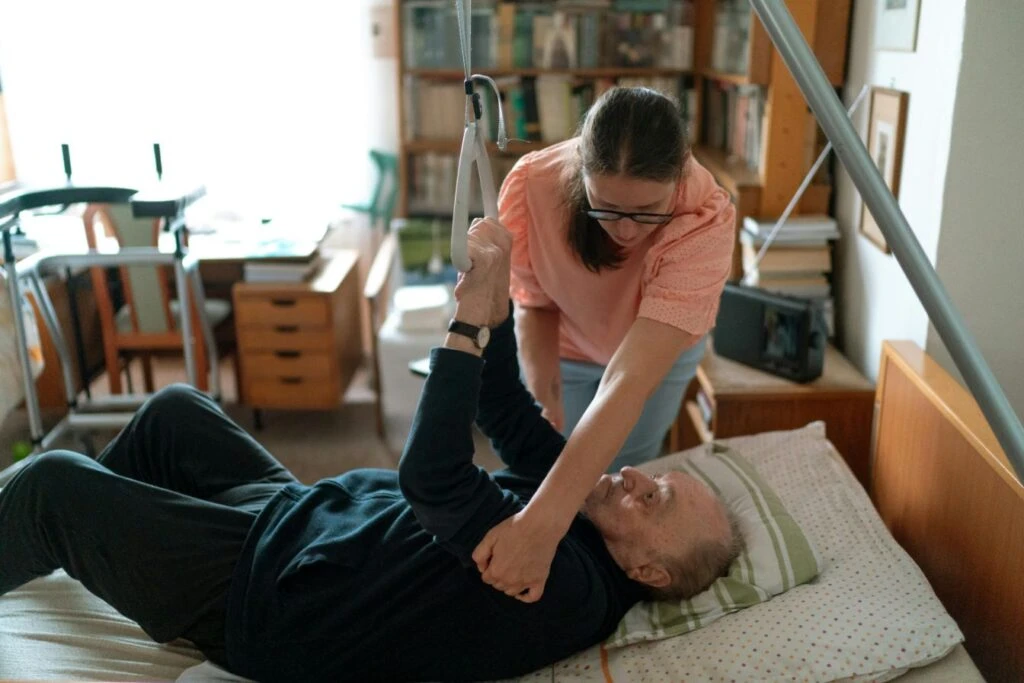
Having the right tools and equipment can make caring for the elderly at home safer, easier, and more comfortable for everyone involved. Simple upgrades can reduce fall risks, improve independence, and take pressure off family caregivers.
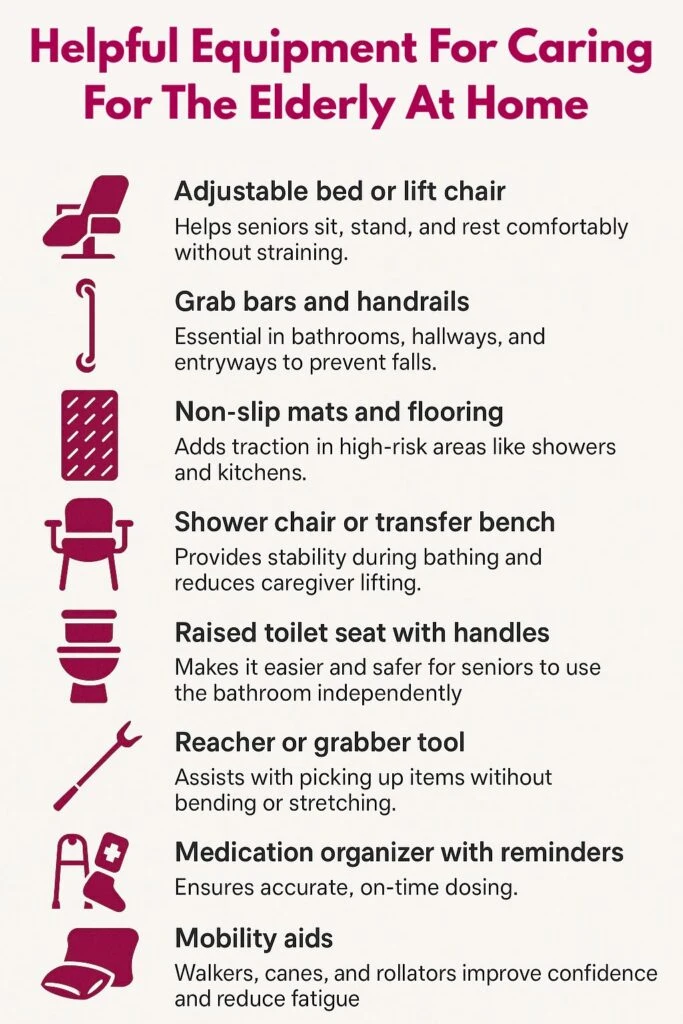
Here are some of the most useful items to consider for help at home senior care:
- Adjustable bed or lift chair: Helps seniors sit, stand, and rest comfortably without straining.
- Grab bars and handrails: Essential in bathrooms, hallways, and entryways to prevent falls.
- Non-slip mats and flooring: Adds traction in high-risk areas like showers and kitchens.
- Shower chair or transfer bench: Provides stability during bathing and reduces caregiver lifting.
- Raised toilet seat with handles: Makes it easier and safer for seniors to use the bathroom independently.
- Reacher or grabber tool: Assists with picking up items without bending or stretching.
- Medical alert system: Offers peace of mind with emergency call features.
- Medication organizer with reminders: Ensures accurate, on-time dosing.
- Mobility aids: Walkers, canes, and rollators improve confidence and reduce fatigue.
- Comfort aids: Support pillows, anti-slip socks, and adaptive utensils for daily comfort and independence.
These small adjustments and tools can dramatically improve quality of life while making at home care for seniors more efficient and stress-free.
Types of At Home Health Care
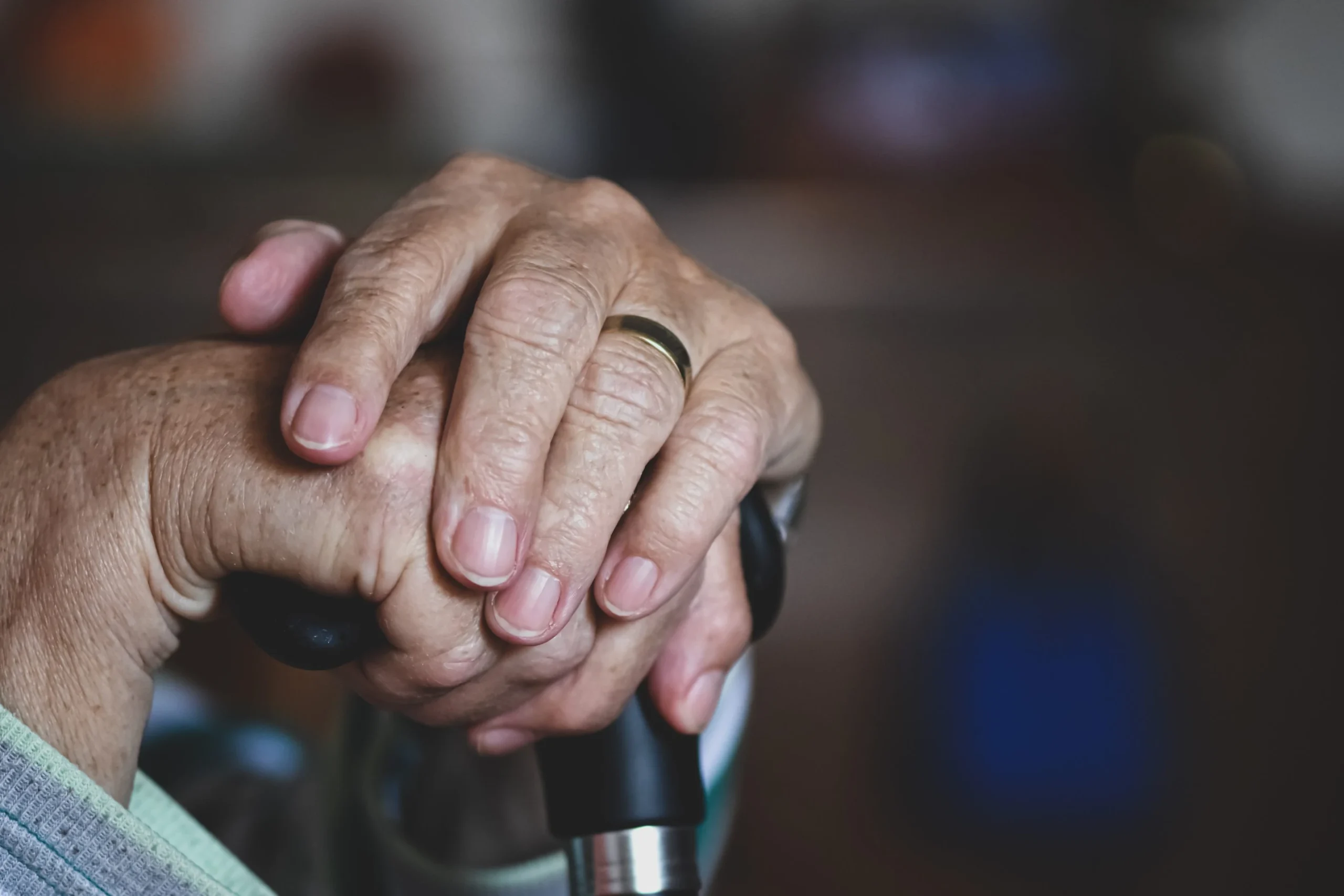
Families often need varying levels of support depending on their loved one’s health and mobility. Here are the main types of help for seniors at home:
- Non medical home care: Provides daily living assistance like meal preparation, light housekeeping, and companionship.
- In home companion care: Focuses on emotional well-being, conversation, and social activities.
- Assisted home care services: Combines personal assistance with limited medical support such as medication management or health monitoring.
- At home health care: Includes skilled nursing or therapy services prescribed by a physician.
Selecting the right type of care depends on each senior’s needs. Families can consult with professionals from Happier at Home to identify which level of care will bring the best results.
Community Resources and Elder Care Options
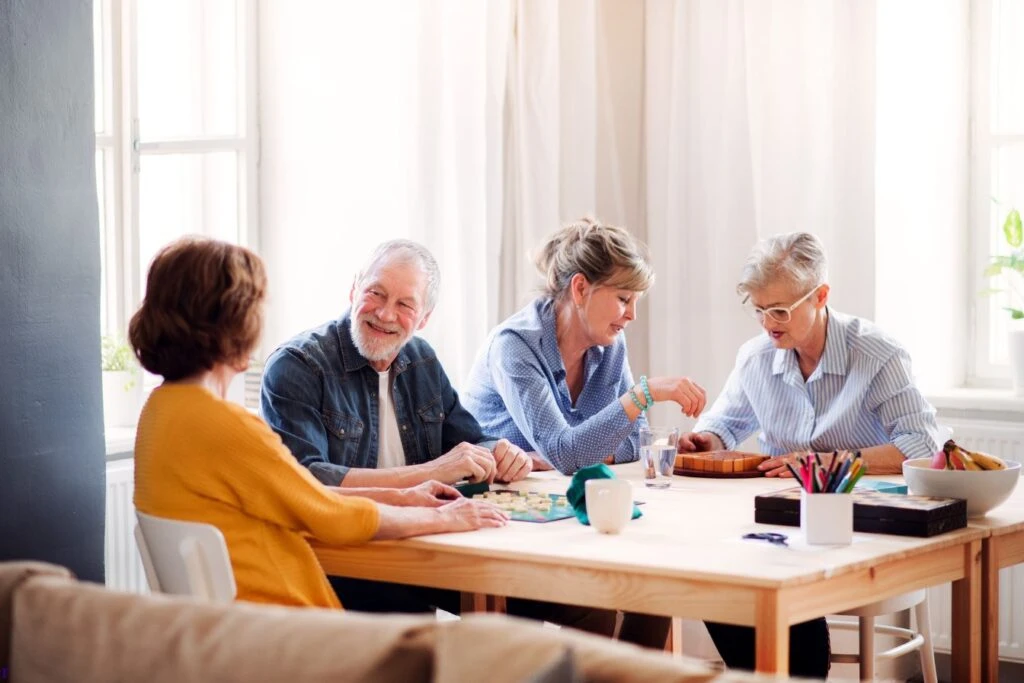
Providing assistance for seniors living at home also means connecting them with the right health and community resources. These can make life safer, easier, and more enjoyable.
Consider:
- Local senior centers or adult day programs for social interaction
- Physical therapy or occupational therapy for mobility
- Transportation and meal delivery programs
- Support groups for family caregivers
- Financial assistance programs for home modifications
- Access to at home health care providers for chronic conditions
Taking advantage of these resources ensures that seniors receive well-rounded support that promotes both independence and wellness.
The Role of Family and Communication
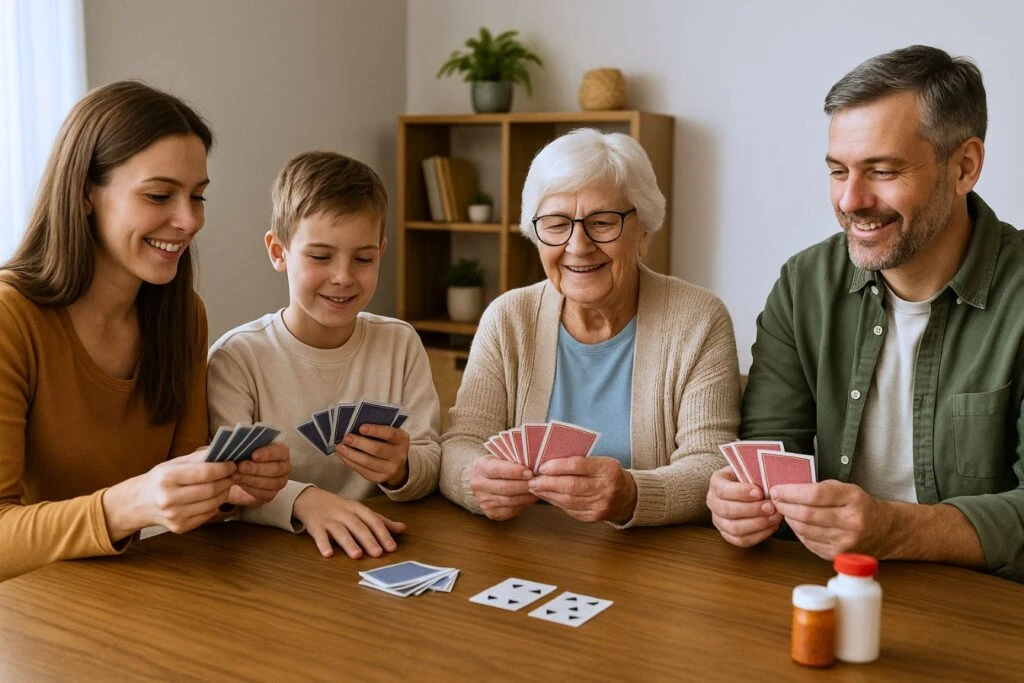
Open communication between family members and caregivers is one of the most overlooked yet vital parts of caring for elderly parents at home.
Regular check-ins help ensure everyone is aligned on needs, routines, and expectations.
Simple practices such as maintaining a shared calendar or weekly phone updates can prevent burnout and create a network of understanding.
Family involvement also provides emotional comfort to seniors, helping them feel connected and cared for.
What We Offer at Happier at Home
At Happier at Home, we specialize in compassionate, dependable help at home senior care services. Our mission is to help families create safe, supportive environments where seniors can thrive independently.
Our services include:
- Non medical home care: Personal assistance with meals, dressing, and light housekeeping.
- Personal Care Services: Bathing, grooming, feeding, exercising, and bathroom needs.
- In home companion care: Engaging companionship to reduce loneliness and improve mood. Exercise, games, etc.
- Assisted home care services: Professional coordination with health providers for comprehensive care.
- Transportation services: Transportation to appointments or to run errands
We believe that quality care begins with respect, understanding, and genuine compassion. Families who partner with Happier at Home gain peace of mind knowing their loved one is cared for by trusted professionals.
Tips for a Safe and Comfortable Home Environment

To make caring for seniors at home more effective, small environmental adjustments can have a major impact:
- Install handrails in hallways and bathrooms
- Use non-slip rugs and flooring
- Keep medications clearly labeled
- Organize frequently used items within easy reach
- Ensure emergency contact numbers are visible
- Set up a simple routine for daily tasks
Safety and comfort go hand in hand. A secure home allows seniors to remain independent and confident.
FAQs About Caring for Elderly at Home
What’s the difference between non medical home care and at home health care?
Non medical home care provides help with daily activities like bathing, meals, and in-home companion care. At home health care involves skilled medical services provided by licensed professionals such as nurses or therapists.
How do I know if my loved one needs assisted home care services?
If your family member requires daily support, medication management, or mobility assistance, assisted home care services can provide the right level of help.
What are affordable options for help for seniors at home?
Combining part-time caregivers with family support, volunteer programs, and community resources can reduce costs while maintaining quality care.
How can I keep my elderly parents active at home?
Encourage activities for elderly at home such as walking, puzzles, or hobbies that match their interests. Social interaction and light movement are key.
What makes Happier at Home different from other care agencies?
Happier at Home focuses on personalized relationships. Our caregivers provide more than just service. They bring companionship, consistency, and genuine care that enriches daily life.
Caring for seniors at home is both a responsibility and a privilege. With the right structure, at-home care for seniors can provide safety, happiness, and independence.
By combining compassion, organization, and professional guidance, families can ensure that their loved ones truly feel happier at home every day.
At Happier at Home, we understand the challenges that come with supporting aging loved ones. Our compassionate caregivers help families find peace of mind by offering personalized help for seniors at home, engaging activities, and dependable care plans designed around each individual’s needs.

